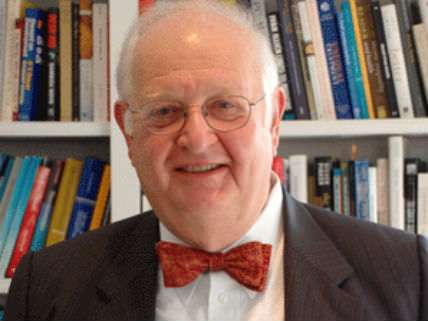Angus Deaton: 2015 Economics Nobel Laureate
"We've seen a remarkable decrease over the past 20 years, and I do forecast that will continue."

Princeton University economist Angus Deaton is this year's recipient of the Sveriges Riksbank Prize in Economic Sciences in Memory of Alfred Nobel. Deaton's work has focused on how to reconcile economic theory with economic data, specifically looking at various measures of well-being, health, inequality, consumption, and economic growth. During a teleconference after the prize announcement, Deaton declared:
"I do foresee a decrease [in poverty]. We've seen a remarkable decrease over the past 20 years, and I do forecast that will continue….But I don't want to sound like a blind optimist."
A great deal of his life's work is summarized in his 2013 book, The Great Escape: Wealth, Health, and the Origin of Inequality. From the introduction:
LIFE IS BETTER NOW than at almost any time in history. More people are richer and fewer people live in dire poverty. Lives are longer and parents no longer routinely watch a quarter of their children die. Yet millions still experience the horrors of destitution and of premature death. The world is hugely unequal. Inequality is often a consequence of progress. Not everyone gets rich at the same time, and not everyone gets immediate access to the latest life-saving measures, whether access to clean water, to vaccines, or to new drugs for preventing heart disease. Inequalities in turn affect progress. This can be good; Indian children see what education can do and go to school too. It can be bad if the winners try to stop others from following them, pulling up the ladders behind them. The newly rich may use their wealth to influence politicians to restrict public education or health care that they themselves do not need.
From the publisher's press release:
Deaton describes vast innovations and wrenching setbacks: the successes of antibiotics, pest control, vaccinations, and clean water on the one hand, and disastrous famines and the HIV/AIDS epidemic on the other. He examines the United States, a nation that has prospered but is today experiencing slower growth and increasing inequality. He also considers how economic growth in India and China has improved the lives of more than a billion people. Deaton argues that international aid has been ineffective and even harmful. He suggests alternative efforts--including reforming incentives to drug companies and lifting trade restrictions--that will allow the developing world to bring about its own Great Escape.
With regard to falling global poverty, the World Bank earlier this month forecasted:
The number of people living in extreme poverty around the world is likely to fall to under 10 percent of the global population in 2015, according to World Bank projections released today, giving fresh evidence that a quarter-century-long sustained reduction in poverty is moving the world closer to the historic goal of ending poverty by 2030.
The Bank uses an updated international poverty line of US $1.90 a day, which incorporates new information on differences in the cost of living across countries (the PPP exchange rates). The new line preserves the real purchasing power of the previous line (of $1.25 a day in 2005 prices) in the world's poorest countries. Using this new line (as well as new country-level data on living standards), the World Bank projects that global poverty will have fallen from 902 million people or 12.8 per cent of the global population in 2012 to 702 million people, or 9.6 per cent of the global population, this year.
Congratulations to Professor Deaton.


Show Comments (43)